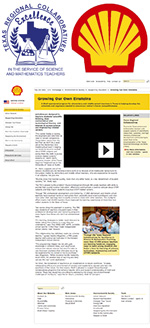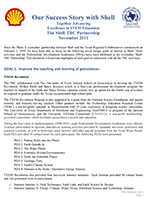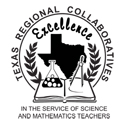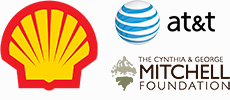 For more posts featuring the Shell-TRC partnership, please view the Shell content category.
For more posts featuring the Shell-TRC partnership, please view the Shell content category.- For information on the Louisiana Outreach Project, please visit the Louisiana Regional Collaboratives page.
Shell Features its Partnership with the TRC in Online Article, Growing Our Own Einsteins
The article, Growing Our Own Einsteins, recently appeared on www.shell.us
You may view the entire article on Shell’s website.
Excerpt from article:
 “The United States is lacking the engineers and scientists we need to remain competitive. The problem stems from the fact that we don’t do a good job at the elementary and middle-school level in helping our students become excited about STEM subjects and giving them the skills to pursue science-related careers,” explains Dr. Kamil Jbeily, executive director of the Texas Regional Collaboratives at the University of Texas at Austin.
“The United States is lacking the engineers and scientists we need to remain competitive. The problem stems from the fact that we don’t do a good job at the elementary and middle-school level in helping our students become excited about STEM subjects and giving them the skills to pursue science-related careers,” explains Dr. Kamil Jbeily, executive director of the Texas Regional Collaboratives at the University of Texas at Austin.
Dr. Jbeily suggests one of the reasons students are not learning science early on is because of an inadequate background in the subject matter by elementary and middle school teachers, who are expected to be experts in all subjects, not just one.
“Studies show that teacher quality, more than any other factor, is a key determinant of student success,” Dr. Jbeily says.
The TRC’s answer to the problem? Equip kindergarten through 8th-grade teachers with skills to provide high-quality science instruction, effectively communicate a positive attitude about STEM subjects and help inspire students to pursue STEM-related careers.
Through TRC professional development and mentoring, 17,000 elementary and middle school teachers have received hands-on instruction from university-level science professors and then have taken their learnings back to public schools to share with other teachers. The multiplier effect means that 30,000 teachers have improved the learning experiences of more than two million students in the State of Texas.
Continue reading on Shell’s website.
Our Success Story with Shell
Our Success Story with Shell: Together Advancing Excellence in STEM Education The Shell-TRC Partnership, November 2011
Download Our Success Story with Shell in PDF format.
 Since the Phase II exemplary partnership between Shell and the Texas Regional Collaboratives commenced on February 2, 2005, we have been able to focus on the following seven unique goals of interest to Shell. These activities and the Professional Development Academies (PDAs) have been attributed to the exemplary Shell-TRC Partnership. This document will provide highlights of each goal in connection with all the TRC activities.
Since the Phase II exemplary partnership between Shell and the Texas Regional Collaboratives commenced on February 2, 2005, we have been able to focus on the following seven unique goals of interest to Shell. These activities and the Professional Development Academies (PDAs) have been attributed to the exemplary Shell-TRC Partnership. This document will provide highlights of each goal in connection with all the TRC activities.
Shell-TRC Partnership Goals
- Improve the teaching and learning of geosciences.
- Encourage students to pursue advanced science which lead to careers in geosciences, engineering, and environmental science.
- Engage students in science fair projects related to geosciences, oil mining, production, and refining.
- Facilitate public engagement in community issues and sustainable development projects.
- Conduct fieldtrips to wetlands, museums, refineries, and unique geological sites across the state to promote teacher knowledge and interest in geoscience education.
- Share the contributions of Shell and engage Shell representatives in events with policy makers, government officials, education leaders, teacher mentors, and other corporate partners.
- Establish the Louisiana Regional Collaboratives (LRCs), two regional P-16 partnerships within Louisiana linking universities with elementary and secondary science teachers to provide sustained and high intensity professional development opportunities.
To learn how the TRC accomplished these goals and more information about the Shell-TRC partnership, download the full document. (PDF)
Shell Awards Grant to TRC (2005)
Overview
The Texas Regional Collaboratives (TRC) for Excellence in Science and Mathematics Teaching program in partnership with Shell will support Texas educators with the training necessary to (1) improve the teaching and learning of geosciences; (2) encourage students to pursue advanced science courses which lead to careers in geosciences, engineering, and environmental science; (3) engage students in science fairs projects related to geosciences, oil mining, production, and refining; (4) facilitate the public engagement in community issues and sustainable development projects; and (5) conduct fieldtrips to wetlands, museums, refineries, and unique geological sites across the state; and (6) establish the Louisiana Regional Collaboratives for Excellence in Science Teaching.
Over the four-year duration of the Project, this partnership will directly serve a total of 500 teachers, each of whom will be involved in an Education Public Outreach (EPO) program to provide high quality professional development to an average of 20 teachers. Through the EPO effort, the Shell-Texas Regional Collaboratives Partnership will serve a total of 10,000 teachers and impact the learning of over 830,000 students across Texas.
Key science education representatives from the State of Louisiana will be invited to participate in organizational meetings, Professional Development Academies, advisory board meetings, Honoring the Teachers events, and annual meetings. TRC will provide information on strategies of replicating the Texas Regional Collaboratives Statewide Network to improve the teaching and learning of science in Louisiana.
The purpose, objectives, and activities of this proposed project are consistent with the Shell Social Investment strategy of aligning social investments with business objectives.
The Texas Regional Collaboratives model builds statewide leadership capacity through training of Instructional Team Members (ITMs). ITMs are empowered to affect change at the regional level by training science teachers who represent campuses and school districts throughout the region. With support from Shell, the Texas Regional Collaboratives will:
Project Impact
The Shell-Texas Regional Collaboratives Partnership will result in excellent returns for Shell and the Texas Regional Collaboratives by benefiting educators, teachers, students, and communities across Texas. Returns on the investment for the partnership include the following:
- Development of knowledge and pedagogical skills of instructional team members and science teachers focusing on the geosciences and including environmental science, careers awareness, and instructional strategies that are effective with ALL students.
- Training and access to high quality research-based instructional materials that address the geosciences.
- Support for student participation in local and regional science fairs with special Shell geosciences awards and funding.
- Implementation of community-wide service projects across the state focusing on geosciences, environmental science and informal community education.
- Design and implementation of innovative field experiences for teachers focusing on the geosciences, geosciences careers, and environmental science.
- Development and dissemination of authentic lesson plans to enhance educational potential of field experiences for students.
- Mentoring, training, and support for Louisiana educators and policymakers interested in creating a professional development program modeled after the Texas Regional Collaboratives.
- Increased visibility for Shell in the Texas State Legislature, with state and local policymakers, and in the statewide science education community.
- Highlighting of Shell’s commitment to science education through statewide activities as well as partnership promotion at the Conference for the Advancement of Science Teaching, the Texas Regional Collaboratives Annual Meeting, the National Science Teachers Association conference, and the Texas Regional Collaboratives website.
A significant impact of this project is the sustainability of the project beyond the four-year duration of the grant. Training of Instructional Team Members and science teachers will develop the leadership capacity necessary to continue professional development and mentoring to hundreds of new teachers in the future. Students who are served by these teachers and whose geoscience education is supported and enhanced by participation in science fairs, field trips, and community service projects will continue to benefit from the strong foundation laid for them.





